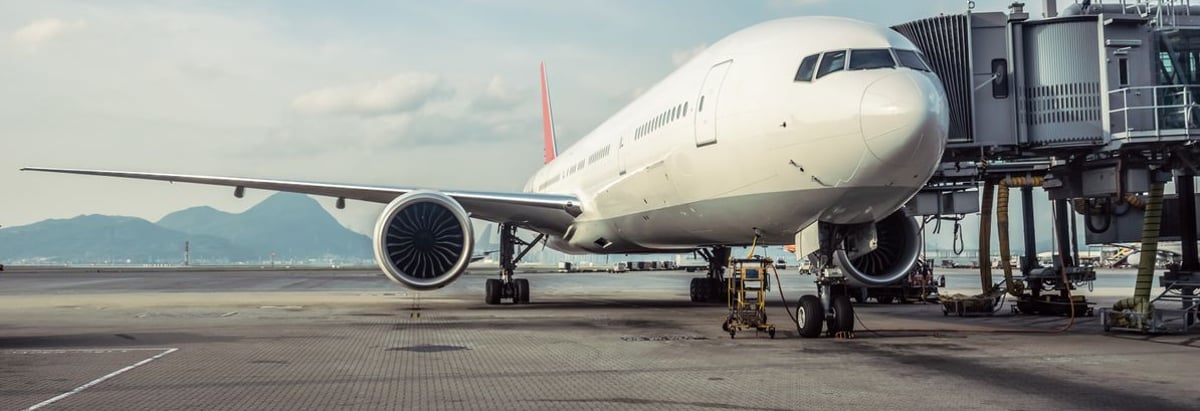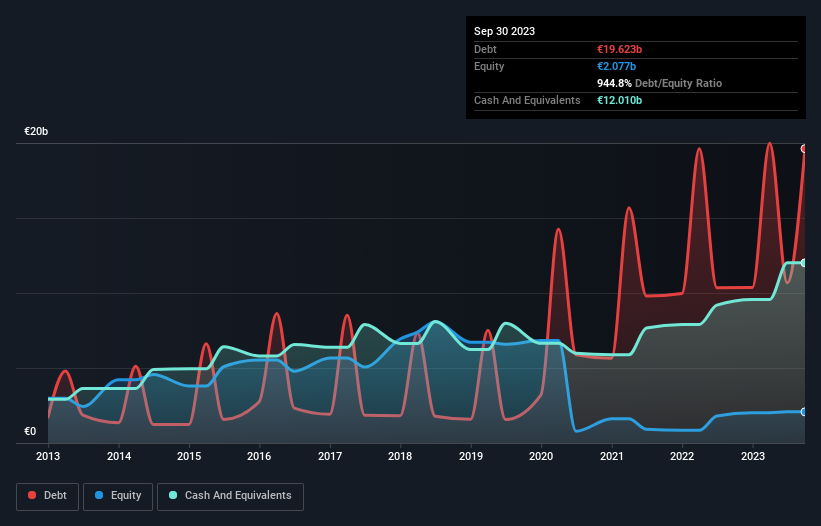- United Kingdom
- /
- Airlines
- /
- LSE:IAG
Here's Why International Consolidated Airlines Group (LON:IAG) Has A Meaningful Debt Burden

Legendary fund manager Li Lu (who Charlie Munger backed) once said, 'The biggest investment risk is not the volatility of prices, but whether you will suffer a permanent loss of capital.' When we think about how risky a company is, we always like to look at its use of debt, since debt overload can lead to ruin. As with many other companies International Consolidated Airlines Group S.A. (LON:IAG) makes use of debt. But the real question is whether this debt is making the company risky.
When Is Debt A Problem?
Debt assists a business until the business has trouble paying it off, either with new capital or with free cash flow. In the worst case scenario, a company can go bankrupt if it cannot pay its creditors. However, a more common (but still painful) scenario is that it has to raise new equity capital at a low price, thus permanently diluting shareholders. By replacing dilution, though, debt can be an extremely good tool for businesses that need capital to invest in growth at high rates of return. The first thing to do when considering how much debt a business uses is to look at its cash and debt together.
See our latest analysis for International Consolidated Airlines Group
What Is International Consolidated Airlines Group's Net Debt?
You can click the graphic below for the historical numbers, but it shows that as of June 2023 International Consolidated Airlines Group had €19.6b of debt, an increase on €10.4b, over one year. However, it does have €12.0b in cash offsetting this, leading to net debt of about €7.61b.

How Healthy Is International Consolidated Airlines Group's Balance Sheet?
According to the last reported balance sheet, International Consolidated Airlines Group had liabilities of €20.7b due within 12 months, and liabilities of €19.7b due beyond 12 months. Offsetting this, it had €12.0b in cash and €1.78b in receivables that were due within 12 months. So it has liabilities totalling €26.7b more than its cash and near-term receivables, combined.
This deficit casts a shadow over the €8.91b company, like a colossus towering over mere mortals. So we definitely think shareholders need to watch this one closely. At the end of the day, International Consolidated Airlines Group would probably need a major re-capitalization if its creditors were to demand repayment.
In order to size up a company's debt relative to its earnings, we calculate its net debt divided by its earnings before interest, tax, depreciation, and amortization (EBITDA) and its earnings before interest and tax (EBIT) divided by its interest expense (its interest cover). This way, we consider both the absolute quantum of the debt, as well as the interest rates paid on it.
International Consolidated Airlines Group has net debt worth 1.7 times EBITDA, which isn't too much, but its interest cover looks a bit on the low side, with EBIT at only 4.4 times the interest expense. While that doesn't worry us too much, it does suggest the interest payments are somewhat of a burden. Pleasingly, International Consolidated Airlines Group is growing its EBIT faster than former Australian PM Bob Hawke downs a yard glass, boasting a 417% gain in the last twelve months. The balance sheet is clearly the area to focus on when you are analysing debt. But ultimately the future profitability of the business will decide if International Consolidated Airlines Group can strengthen its balance sheet over time. So if you want to see what the professionals think, you might find this free report on analyst profit forecasts to be interesting.
Finally, a company can only pay off debt with cold hard cash, not accounting profits. So the logical step is to look at the proportion of that EBIT that is matched by actual free cash flow. During the last two years, International Consolidated Airlines Group generated free cash flow amounting to a very robust 91% of its EBIT, more than we'd expect. That positions it well to pay down debt if desirable to do so.
Our View
While International Consolidated Airlines Group's level of total liabilities has us nervous. To wit both its conversion of EBIT to free cash flow and EBIT growth rate were encouraging signs. We think that International Consolidated Airlines Group's debt does make it a bit risky, after considering the aforementioned data points together. Not all risk is bad, as it can boost share price returns if it pays off, but this debt risk is worth keeping in mind. There's no doubt that we learn most about debt from the balance sheet. However, not all investment risk resides within the balance sheet - far from it. Case in point: We've spotted 1 warning sign for International Consolidated Airlines Group you should be aware of.
If you're interested in investing in businesses that can grow profits without the burden of debt, then check out this free list of growing businesses that have net cash on the balance sheet.
New: AI Stock Screener & Alerts
Our new AI Stock Screener scans the market every day to uncover opportunities.
• Dividend Powerhouses (3%+ Yield)
• Undervalued Small Caps with Insider Buying
• High growth Tech and AI Companies
Or build your own from over 50 metrics.
Have feedback on this article? Concerned about the content? Get in touch with us directly. Alternatively, email editorial-team (at) simplywallst.com.
This article by Simply Wall St is general in nature. We provide commentary based on historical data and analyst forecasts only using an unbiased methodology and our articles are not intended to be financial advice. It does not constitute a recommendation to buy or sell any stock, and does not take account of your objectives, or your financial situation. We aim to bring you long-term focused analysis driven by fundamental data. Note that our analysis may not factor in the latest price-sensitive company announcements or qualitative material. Simply Wall St has no position in any stocks mentioned.
About LSE:IAG
International Consolidated Airlines Group
Engages in the provision of passenger and cargo transportation services in the United Kingdom, Spain, the United States, and rest of the world.
Undervalued with proven track record.


